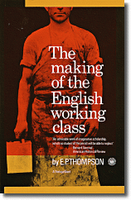In his first book, The Progressive Patriot--part autobiography, part polemic--Bragg considers his own family history and childhood, the influences of thinkers and artists such as George Orwell, Rudyard Kipling and The Clash, and reflects on how they have shaped his sense of Englishness. He also examines the historical impact of such things as theHere are three of Bragg's favorite books on the subject of Englishness:Magna Carta, the civil war and the miners' strike on the formation of the country's national consciousness.
The Lion and The Unicorn - Socialism and the English Genius by George OrwellClick here to read about Bragg's seven other favorites.
Written during the Blitz, with Nazi invasion seemingly imminent, Orwell wonders aloud if there is anything in this country worth defending, even dying for. The picture he paints of "a family in which the wrong people are in charge" still resonates, as do his attacks on an English intelligentsia "ashamed of their own country". The most important insight he offers is that Englishness is constantly changing: "it stretches into the future and the past, there is something in it that persists, as in a living creature". The greatest book written on the subject from a left-wing perspective.
The World Turned Upside Down by Christopher Hill
Hill's masterpiece captures the turmoil of the one true revolutionary episode in English history, when the principle of government by consent led to the execution of the king. A great period of radical thinking was unleashed, much of it coming from below. Diggers, Ranters, Levellers and others seized the moment to agitate for full democratic accountability. All their arguments are here, alongside those of the grandees who eventually snuffed out the English revolution.
The Making of the English Working Class by EP Thompson
The founding text of English social history. Thompson shows how the ordinary people of England were not content to wait for political reforms to be handed down to them from above, but were actively fighting for their rights throughout the late 18th and early 19th centuries.
Sean O'Hagan reviewed Bragg's The Progressive Patriot earlier this month. He wrote:
Pete Lit suggests The Progressive Patriot for those who "like Billy Bragg's politics and worldview but aren't fond of his, shall we say, informal vocal delivery."Bragg has dedicated the book to his musical heroes, the Clash, but one senses that the real motivating force behind it is Orwell, whose essay 'The Lion and the Unicorn: Socialism and the English Genius'
is referred to more than once. It was that same essay on which John Major built his now infamous anti-European Union speech in 1993, extolling the national characteristics as 'long shadows on county [cricket] grounds, warm beer, invincible green suburbs, dog lovers and pools fillers and, as George Orwell said, old maids bicycling to Holy Communion through the morning mist'.
Bragg points out that Orwell's original vision of Britishness was, unlike Major's, extraordinarily contemporary rather than unrealistically nostalgic. Alongside the old maids on wheels, it also included 'lorries on the Great North Road' and 'the queues outside the labour exchange'. Bragg's book, too, is a paean to contemporary England in all its turbulent richness.
--Marshal Zeringue







